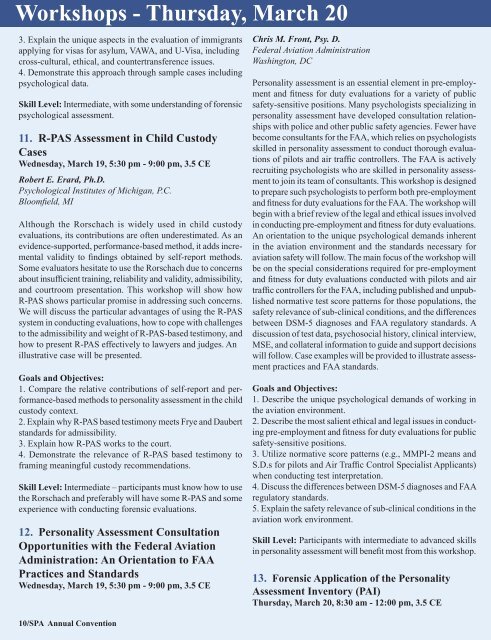6xOUtLU0d
6xOUtLU0d
6xOUtLU0d
You also want an ePaper? Increase the reach of your titles
YUMPU automatically turns print PDFs into web optimized ePapers that Google loves.
Workshops - Thursday, March 20<br />
3. Explain the unique aspects in the evaluation of immigrants<br />
applying for visas for asylum, VAWA, and U-Visa, including<br />
cross-cultural, ethical, and countertransference issues.<br />
4. Demonstrate this approach through sample cases including<br />
psychological data.<br />
Skill Level: Intermediate, with some understanding of forensic<br />
psychological assessment.<br />
11. R-PAS Assessment in Child Custody<br />
Cases<br />
Wednesday, March 19, 5:30 pm - 9:00 pm, 3.5 CE<br />
Robert E. Erard, Ph.D.<br />
Psychological Institutes of Michigan, P.C.<br />
Bloomfield, MI<br />
Although the Rorschach is widely used in child custody<br />
evaluations, its contributions are often underestimated. As an<br />
evidence-supported, performance-based method, it adds incremental<br />
validity to findings obtained by self-report methods.<br />
Some evaluators hesitate to use the Rorschach due to concerns<br />
about insufficient training, reliability and validity, admissibility,<br />
and courtroom presentation. This workshop will show how<br />
R-PAS shows particular promise in addressing such concerns.<br />
We will discuss the particular advantages of using the R-PAS<br />
system in conducting evaluations, how to cope with challenges<br />
to the admissibility and weight of R-PAS-based testimony, and<br />
how to present R-PAS effectively to lawyers and judges. An<br />
illustrative case will be presented.<br />
Goals and Objectives:<br />
1. Compare the relative contributions of self-report and performance-based<br />
methods to personality assessment in the child<br />
custody context.<br />
2. Explain why R-PAS based testimony meets Frye and Daubert<br />
standards for admissibility.<br />
3. Explain how R-PAS works to the court.<br />
4. Demonstrate the relevance of R-PAS based testimony to<br />
framing meaningful custody recommendations.<br />
Skill Level: Intermediate – participants must know how to use<br />
the Rorschach and preferably will have some R-PAS and some<br />
experience with conducting forensic evaluations.<br />
12. Personality Assessment Consultation<br />
Opportunities with the Federal Aviation<br />
Administration: An Orientation to FAA<br />
Practices and Standards<br />
Wednesday, March 19, 5:30 pm - 9:00 pm, 3.5 CE<br />
10/SPA Annual Convention<br />
Chris M. Front, Psy. D.<br />
Federal Aviation Administration<br />
Washington, DC<br />
Personality assessment is an essential element in pre-employment<br />
and fitness for duty evaluations for a variety of public<br />
safety-sensitive positions. Many psychologists specializing in<br />
personality assessment have developed consultation relationships<br />
with police and other public safety agencies. Fewer have<br />
become consultants for the FAA, which relies on psychologists<br />
skilled in personality assessment to conduct thorough evaluations<br />
of pilots and air traffic controllers. The FAA is actively<br />
recruiting psychologists who are skilled in personality assessment<br />
to join its team of consultants. This workshop is designed<br />
to prepare such psychologists to perform both pre-employment<br />
and fitness for duty evaluations for the FAA. The workshop will<br />
begin with a brief review of the legal and ethical issues involved<br />
in conducting pre-employment and fitness for duty evaluations.<br />
An orientation to the unique psychological demands inherent<br />
in the aviation environment and the standards necessary for<br />
aviation safety will follow. The main focus of the workshop will<br />
be on the special considerations required for pre-employment<br />
and fitness for duty evaluations conducted with pilots and air<br />
traffic controllers for the FAA, including published and unpublished<br />
normative test score patterns for those populations, the<br />
safety relevance of sub-clinical conditions, and the differences<br />
between DSM-5 diagnoses and FAA regulatory standards. A<br />
discussion of test data, psychosocial history, clinical interview,<br />
MSE, and collateral information to guide and support decisions<br />
will follow. Case examples will be provided to illustrate assessment<br />
practices and FAA standards.<br />
Goals and Objectives:<br />
1. Describe the unique psychological demands of working in<br />
the aviation environment.<br />
2. Describe the most salient ethical and legal issues in conducting<br />
pre-employment and fitness for duty evaluations for public<br />
safety-sensitive positions.<br />
3. Utilize normative score patterns (e.g., MMPI-2 means and<br />
S.D.s for pilots and Air Traffic Control Specialist Applicants)<br />
when conducting test interpretation.<br />
4. Discuss the differences between DSM-5 diagnoses and FAA<br />
regulatory standards.<br />
5. Explain the safety relevance of sub-clinical conditions in the<br />
aviation work environment.<br />
Skill Level: Participants with intermediate to advanced skills<br />
in personality assessment will benefit most from this workshop.<br />
13. Forensic Application of the Personality<br />
Assessment Inventory (PAI)<br />
Thursday, March 20, 8:30 am - 12:00 pm, 3.5 CE


